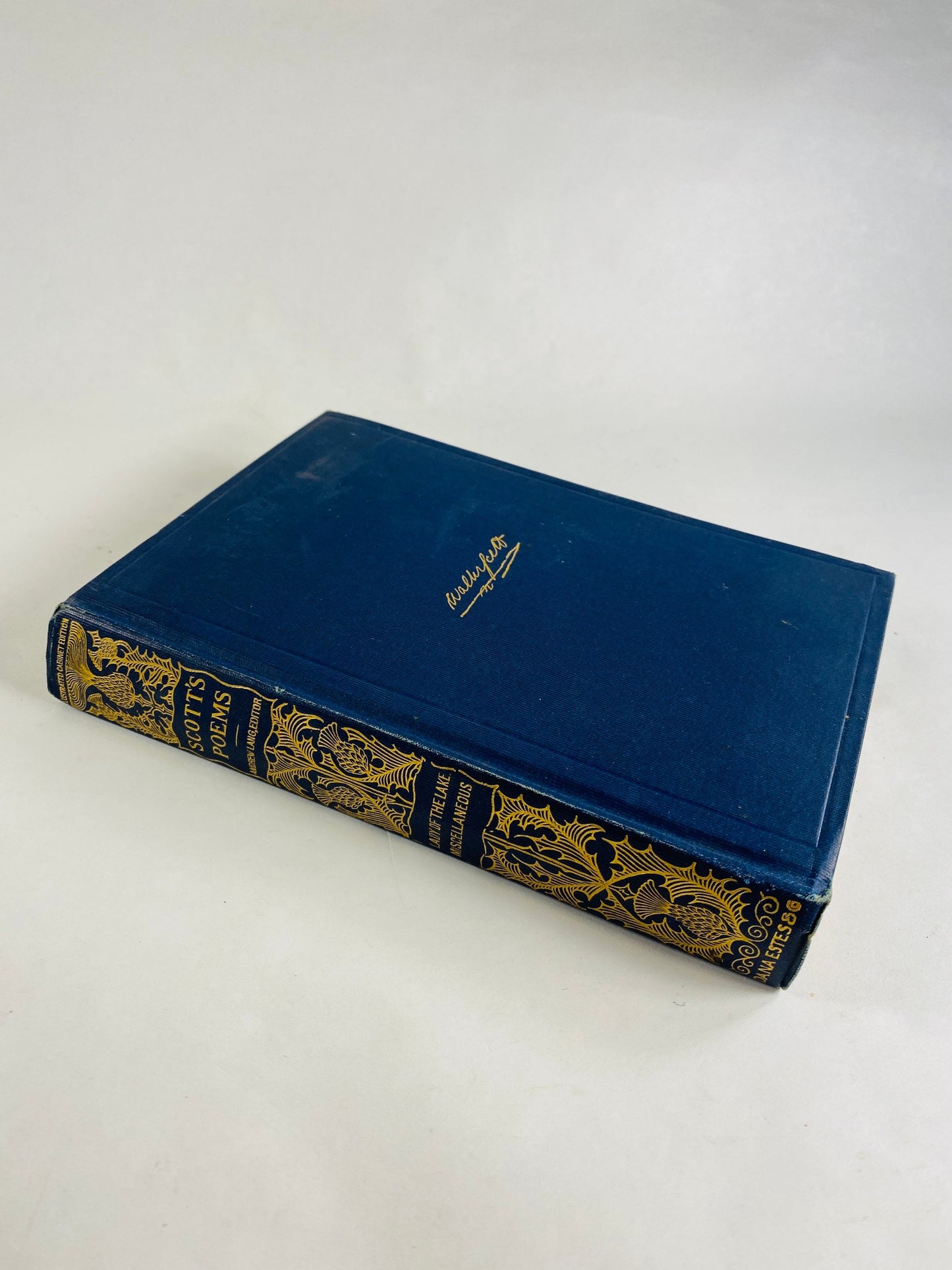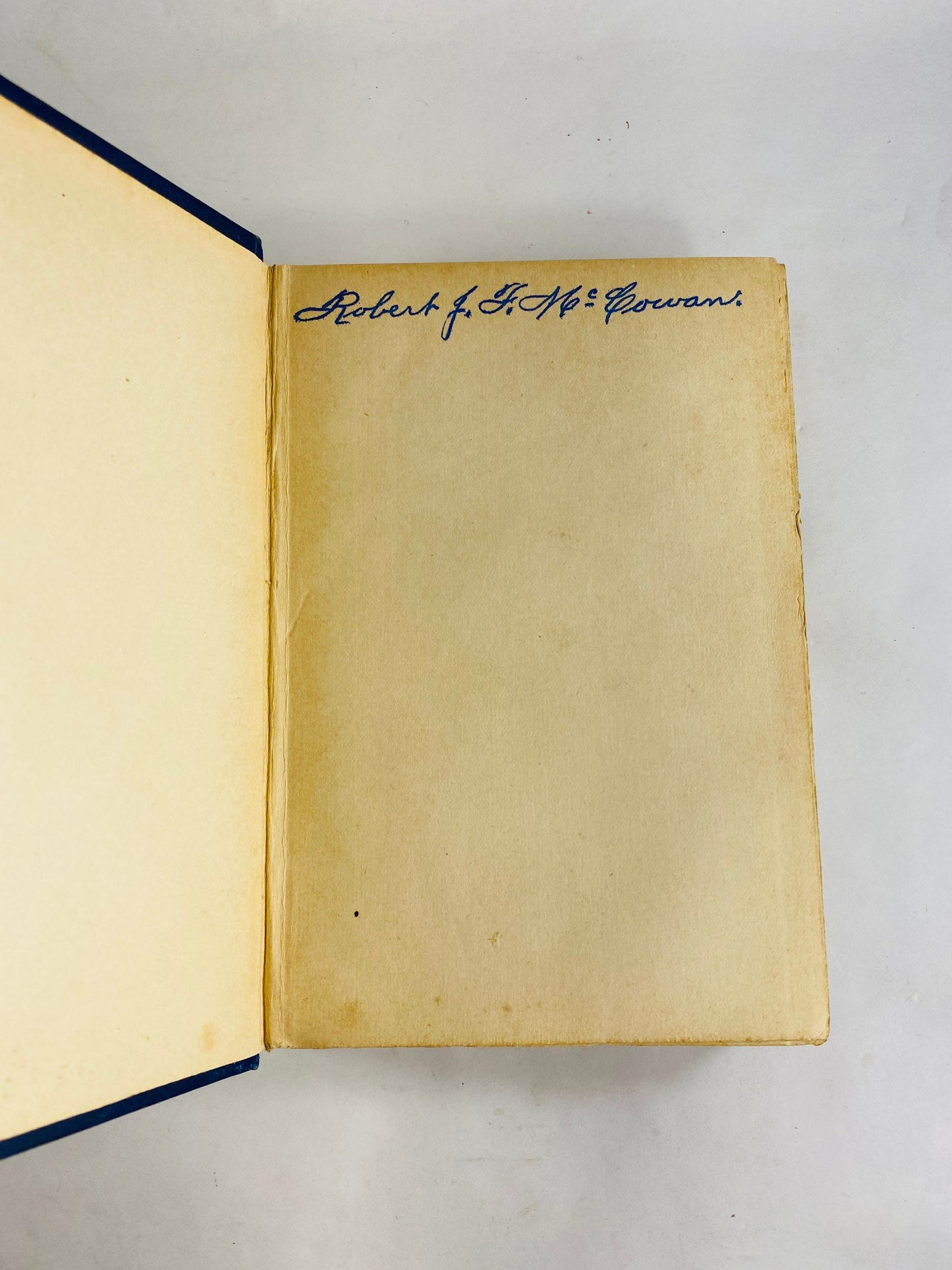Vintage Bookworms
1900 Poetical Works of Sir Walter Scott Vintage blue book gilt tooling. Lady of the Lake Lay of Last Minstrel
1900 Poetical Works of Sir Walter Scott Vintage blue book gilt tooling. Lady of the Lake Lay of Last Minstrel
Couldn't load pickup availability
Sir Walter Scott, 1st Baronet FRSE FSA Scot (15 August 1771 – 21 September 1832) was a Scottish historical novelist, poet, playwright and historian. Many of his works remain classics of both English-language literature and of Scottish literature. Famous titles include Ivanhoe, Rob Roy, Old Mortality, The Lady of the Lake, Waverley, The Heart of Midlothian and The Bride of Lammermoor.
Although primarily remembered for his extensive literary works and his political engagement, Scott was an advocate, judge and legal administrator by profession, and throughout his career combined his writing and editing work with his daily occupation as Clerk of Session and Sheriff-Depute of Selkirkshire.
A prominent member of the Tory establishment in Edinburgh, Scott was an active member of the Highland Society, served a long term as President of the Royal Society of Edinburgh (1820–32) and was a Vice President of the Society of Antiquaries of Scotland (1827-1829).
In 1796, Scott's friend James Ballantyne founded a printing press in Kelso, in the Scottish Borders. Through Ballantyne, Scott was able to publish his first work, including "Glenfinlas" and "The Eve of St. John", and his poetry then began to bring him to public attention. In 1805, The Lay of the Last Minstrel captured wide public imagination, and his career as a writer was established in spectacular fashion.
The way was long, the wind was cold,
The Minstrel was infirm and old
— The Lay of the Last Minstrel (first lines)
He published many other poems over the next ten years, including the popular The Lady of the Lake, printed in 1810 and set in the Trossachs. Portions of the German translation of this work were set to music by Franz Schubert. One of these songs, "Ellens dritter Gesang", is popularly labelled as "Schubert's Ave Maria".
Beethoven's opus 108 "Twenty-Five Scottish Songs" includes 3 folk songs whose words are by Walter Scott.
Marmion, published in 1808, produced lines that have become proverbial. Canto VI. Stanza 17 reads:
Yet Clare's sharp questions must I shun
Must separate Constance from the nun
Oh! what a tangled web we weave
When first we practise to deceive!
A Palmer too! No wonder why
I felt rebuked beneath his eye.[23]
In 1809 Scott persuaded James Ballantyne and his brother to move to Edinburgh and to establish their printing press there. He became a partner in their business. As a political conservative,[24] Scott helped to found the Tory Quarterly Review, a review journal to which he made several anonymous contributions. Scott was also a contributor to the Edinburgh Review, which espoused Whig views.
Scott was ordained as an elder in the Presbyterian Church of Duddington and sat in the General Assembly for a time as representative elder of the burgh of Selkirk.
When the lease of Ashestiel expired in 1811, Scott bought Cartley Hole Farm, on the south bank of the River Tweed nearer Melrose. The farm had the nickname of "Clarty Hole" (Scots for "muddy hole"), and when Scott built a family cottage there in 1812 he named it "Abbotsford". He continued to expand the estate, and built Abbotsford House in a series of extensions.
In 1813 Scott was offered the position of Poet Laureate. He declined, due to concerns that "such an appointment would be a poisoned chalice", as the Laureateship had fallen into disrepute, due to the decline in quality of work suffered by previous title holders, "as a succession of poetasters had churned out conventional and obsequious odes on royal occasions."[25] He sought advice from the Duke of Buccleuch, who counseled him to retain his literary independence, and the position went to Scott's friend, Robert Southey. - Wikipedia
CONDITION: VG-
ABOUT: The Poetical Works of Sir Walter Scott, 1900
Volume 3
Please see all pictures and noted condition. Grading scale:
- Fine: Unused, like new, without any flaws.
- VG+ (Very Good +): May have been opened & read, but no defects to the book, jacket or pages. Shows some small signs of wear but no tears on binding or paper. ⭐️
- VG (Very Good): More obvious signs of use with no significant creasing or defects.
- VG- (Very Good): Worn. Defects are noted.
- Poor / Fair / Former Library Book: Worn book that has complete text pages (including those with maps or plates) but may lack endpapers, have loose binding.
To preserve the condition of your book, place your book upright on a shelf with the spine facing outward. Books should be firmly pressed together but not wedged in tightly, which causes stress on the bindings. Shelves should not be exposed to direct sunlight and should be in a dry, insect-free location.
Materials
Materials
Dimensions
Dimensions
Care information
Care information
















